DO-IT News May 2012

Volume 20, Number 1
Below are the articles of the DO-IT News May 2012 newsletter. These articles can also be seen all on one page at the Full Newsletter option.
DO-IT Engages with CSCP
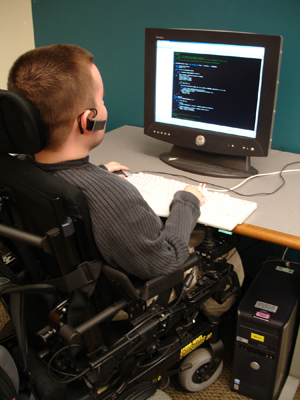
The DO-IT Center is a partner with the Computer Science Collaboration Project (CSCP). Funded by the National Science Foundation and hosted by the EdLab Group, the CSCP promotes the participation of individuals with disabilities in computing fields of study and employment. See www.cscproject.org for project details.
DO-IT has been happy to share resources that have been created by earlier projects funded by the NSF with the same purpose. In particular, DO-IT helps project collaborators:
- Recruit participants with disabilities
- Make their websites more accessible to visitors with disabilities
- Apply universal design to information technology, physical spaces, instruction, and project activities
- Accommodate students with disabilities in their activities
- Locate resources
It is expected that projects like these will increase the participation in computing fields and improve these fields with the perspectives and talents of people with disabilities.
DO-IT Students Accepted Into the Young Scholars Program
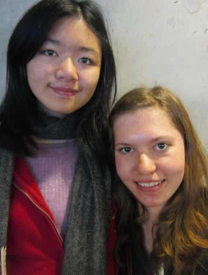
Jessie (2011 Scholar) and Angela (2010 Scholar) were accepted to the highly competitive Young Scholars Program through the UW Center for Neurotechnology. The ten-week summer program places students into research labs on the UW Seattle campus, and offers a stipend for the students' work.
Students also receive trainings in ethics, communication, lab safety, and scientific presentation skills. At the end of the summer, students participate in a summer research symposium to gain experience preparing and presenting research results to the scientific community.
The Young Scholars program is designed to provide a solid foundation for future scientific study. The DO-IT community is excited for Jessie and Angela. We're proud that their academic accomplishments and leadership skills have been recognized by acceptance to the program! More information about the Young Scholars Program is available through the CNT website at: www.csne-erc.org/content/young-scholars-program.
Collaborations with Washington MESA
At Summer Study 2011, DO-IT and Mathematics Engineering Science Achievement (MESA) staff tested some of the activities in MESA's wind energy curriculum with students who have many types of disabilities. Students offered suggestions for making the activities more accessible. The activity was highly rated. It gave students the opportunity to provide their expertise and leadership, and allowed MESA to gain knowledge about accommodations and universal design of their projects.
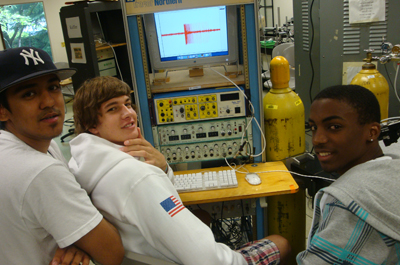
Subsequent grant funding provided by the Boeing Company in 2012 allows DO-IT to strengthen its partnership with MESA, in a project where DO-IT staff collaborate with MESA on curriculum.
DO-IT technical staff will review MESA's current curriculum and will make recommendations to ensure that online content is presented in an accessible format that can be accessed by people with disabilities, including those who are blind.
DO-IT staff will also develop guidelines to help teachers make MESA materials accessible to students with specific types of disabilities. They will include examples of accommodations for activities as well as principles of universal design that can be proactively applied to make curriculum and activities more accessible to all students.
Project staff will provide professional development to teachers, including MESA teachers, regarding how STEM can be made accessible to students with disabilities through accommodations and universal design. They will share relevant content in an online Knowledge Base hosted by the DO-IT Center.
The collaboration will increase the participation of people with disabilities in STEM fields and improve these fields with the talents and perspectives of this group. The comprehensive, integrated, and collaborative efforts will result in improved postsecondary education and employment outcomes for people with disabilities. As STEM educators employ more inclusive practices and as students with disabilities who benefit from project activities enter the work force and strengthen the labor pool in STEM careers, the return on the investment will be large.
Learning About Sensorimotor Neural Engineering
Through a unique collaboration with the DO-IT Center, the Center for Neurotechnology (CNT) hosted a learning lab for twenty-five DO-IT students with disabilities.
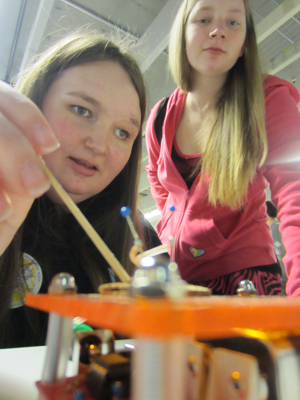
During the learning lab, students heard a presentation about sensorimotor neural engineering and learned about research collaborations facilitated by the CNT. They learned about optical illusions and signal processing in the visual cortex. They saw examples of brains from various small animals, and were able to use Spikerboxes that demonstrate action potentials in cockroach legs. Students were able to stimulate the legs in a variety of ways to observe the signals produced. A highly-rated activity involved operating a wheeled robot by using electrodes that sensed signals associated with muscle movement.
In a post-activity survey, 92% of the students stated that activities like the CNT learning lab can motivate youth with disabilities to pursue science and engineering fields. When asked if participation in the learning lab increased their interest in sensorimotor neural engineering, 80% of students said "yes." Student comments included:
- "I want to learn more about implantable devices."
- "It is cool-almost science fiction to control something with your brain!"
- "I want to know more about this field. Before I had no interest in this field."
Students involved in the activity helped create a video to share their experience and demonstrate the value of the activity to others. Students decided what type of information should be in the video, the composition of pictures and video clips, and created the narration. The video is available online at the CNT website at www.csne-erc.org/news/csnedo-it-event.
This collaborative activity with CNT benefitted society by engaging students with disabilities to increase their interest in STEM fields—especially sensorimotor neural engineering. The activity serves as a model for others who want to promote STEM fields to youth with disabilities, and the student video posted online can help students get excited about the field.
Ambassador Profile: Randy Hammer
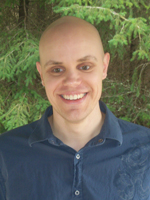
My name is Randy Hammer, and I'm a DO-IT Ambassador. I studied computer science and networking for my undergraduate degree at The Evergreen State College in Olympia, WA. After working for about ten years, I studied technology management for my master's degree at City University of Seattle. I started my technology career supporting end users, mostly in desktop and application support. Over time, I moved on to managing teams and projects.
Currently, I'm a systems analyst. This means that I translate customer and company requirements for our products into specific language for software developers. I also support applications, provide pre- and post-sales support to our sales and marketing teams, and roadmap future product development. In short, I'm the bridge between those who work on the technical side and those who don't. I work to make technology understandable for nontechnologists and provide guidance for the technologists. The product I work on helps to prevent fraud and identity theft, which is a fast-growing crime. I take a lot of pride in my involvement in the product and feel that I am directly advocating for the consumers and companies impacted by fraudulent transactions and activities.
I am completely blind, so I use screen reading software to access computers. Early in my career, screen readers didn't work with all computer applications. As screen readers have improved and mainstream computer hardware and software have become more accessible, I have gained more and more access to applications, including those pertinent to my job. As of now, the only real job functions that I cannot perform relate to creating or analyzing diagrams. Computing to me equates to access to information. I always look to learn, experience, and grow. Computers and technology provide me more access to information than I could have dreamed.
Staff Profile: Penny Hinke
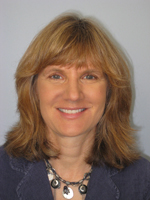
"Hiya!" as they say in Manchester (England, that is. A recent newcomer to Seattle, I've been bemused by all the English place names in Washington.) My name is Penny Hinke. I've been working for DO-IT for about a year now, primarily as an academic coach. I work one-on-one with college students who have a disability to help them develop strategies that will enable them to achieve their goals and succeed at college, faster and more effectively than if they were on their own.
A Midwesterner by birth and temperament, I never imagined that one day I'd be living in the Pacific Northwest, but now that I'm here, I think I'll stay! I was born in Colby, Wisconsin and received both my bachelor's and master's degree from the University of Wisconsin-Madison (the other UW). As an undergraduate, one of my goals was to become fluent in French, so I applied for the junior year abroad program and lived in Aix-en-Provence in southern France for nine months (I know—a tough assignment, but someone had to do it!). I'd encourage anyone who has the opportunity to study abroad to take it. It was a life-changing experience!
After college, I moved to Minneapolis, Minnesota, where I worked as a publications editor for several years before moving to Manchester, England with my husband and our two-year old son in 1994. It was while I was living in England that I embarked on my present career path. I worked as a study coach for students with disabilities at the University of Manchester for ten years.
A year ago, after living in England for 16 years, my husband and I moved back to the US, in part to be closer to our son, who had just begun his studies at the University of Michigan, Ann Arbor.
Making the transition from Manchester to Seattle hasn't been too difficult, thanks in part to all those years in England. Unlike most newcomers to the region, I'm not inclined to moan about the weather. What's to moan about? At least we have real summers here! My experience in England has given me other valuable survival skills as well, such as a deep appreciation for the therapeutic value of a cup of tea and the ability to detect irony in humor.
These days, when I'm not working, I can be found training for the Rock 'n Roll half marathon, practicing the piano for an upcoming piano recital, or choosing paint colors for our newly remodeled basement.
Working for DO-IT has allowed me to combine my passion for helping people reach their potential, academic and otherwise, with my preference for working in higher education. Thank you, DO-IT, for giving me this opportunity!
New Videos on Accessibility
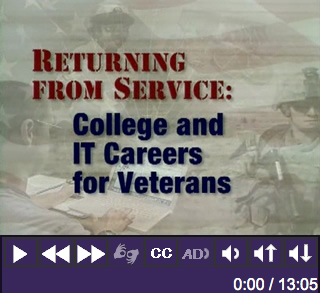
If you haven't seen our latest collection of videos, be sure to head over to www.washington.edu/doit/videos/index.php to take a look. New titles include
- STEM and People with Disabilities—learn how students with disabilities successfully pursue science, technology, engineering, and mathematics fields with the assistance of accessible STEM programs.
- Returning from Service: College and IT Careers for Veterans—veterans with disabilities and postsecondary administrators discuss strategies for encouraging veterans with disabilities to pursue computing and information technology fields.
We also have updated several of our most popular videos that cover a variety of topics including how to prepare students with disabilities for careers, making distance learning accessible, the DO-IT Scholars program, including people with disabilities in the workplace, and much more. Our videos can be streamed or downloaded and all are open captioned and audio described. Feel free to use our videos in your next training seminar, presentation, or post to your website.
How Can You DO-IT?
- Sign up to receive DO-IT News if this newsletter was not mailed directly to you.
- Volunteer as a Mentor or to help with one of our Summer Study programs.
- Pass this newsletter on to someone you know who can benefit from our programs.
- Donate money to support and extend DO-IT activities including sponsoring Scholars from states outside of Washington, special events, work-based learning experiences, participant attendant or travel costs, refreshments for program participants, and creation and distribution of educational videotapes and publications.
DO-IT today by completing the form below! You may also make a secure online credit card donation at the University of Washington Make a Gift page by selecting the "DO-IT Program Gift Fund" option.
___ Sign me up to receive copies of DO-IT NEWS, a free program newsletter.
___ Send me more information about DO-IT volunteer opportunities.
___ I would like to make a donation (payable to the University of Washington, Federal ID#91-6001537) to support DO-IT operations.
___ I have enclosed a check for $____________
___ Please charge $____________ to my credit card.
___ VISA ___ Mastercard
Date _____________
Card Number __________________________ Expiration Date _____________
Card Holder Name ___________________________________________________
Signature _____________________________________________________
Address ____________________________________________________________
City __________________________ State _____________ Zip ____________
Phone: Home __________________________ Business ____________________
E-mail: ____________________________________________________________
Your gift is tax-deductible as specified in IRS regulations. Pursuant to RCW 19.09, the University of Washington is registered as a charitable organization with the Secretary of State, State of Washington. For more information, call the Office of the Secretary of State, 1-800-322-4483.
Mail to:
DO-IT
University of Washington
Box 354842
Seattle, WA 98195-4842
Thank you!
More About DO-IT
DO-IT News is published at the University of Washington with input from DO-IT staff, Pals, Scholars, Ambassadors, and Mentors. DO-IT is primarily funded by the National Science Foundation, the U.S. Department of Education, and the State of Washington.
DO-IT (Disabilities, Opportunities, Internetworking, and Technology) serves to increase the successful participation of individuals with disabilities in challenging academic programs such as those in science, engineering, mathematics, and technology. Primary funding for DO-IT is provided by the National Science Foundation, the State of Washington, and the U.S. Department of Education. DO-IT is a collaboration of UW Information Technology and the Colleges of Engineering and Education at the University of Washington.
Grants and gifts fund DO-IT publications, videos, and programs to support the academic and career success of people with disabilities. Contribute today by sending a check to DO-IT, Box 354842, University of Washington, Seattle, WA 98195-4842.
Your gift is tax deductible as specified in IRS regulations. Pursuant to RCW 19.09, the University of Washington is registered as a charitable organization with the Secretary of State, state of Washington. For more information call the Office of the Secretary of State, 1-800-322-4483.
To order free publications or newsletters use the DO-IT Publications Order Form; to order videos and training materials use the Videos, Books and Comprehensive Training Materials Order Form.
For further information, to be placed on the DO-IT mailing list, request materials in an alternate format, or to make comments or suggestions about DO-IT publications or web pages contact:
DO-IT
University of Washington
Box 354842
Seattle, WA 98195-4842
doit@uw.edu
www.uw.edu/doit
206-685-DOIT (3648) (voice/TTY)
888-972-DOIT (3648) (voice/TTY)
206-221-4171 (fax)
509-328-9331 (voice/TTY)
Spokane Founder and Director: Sheryl Burgstahler, Ph.D.